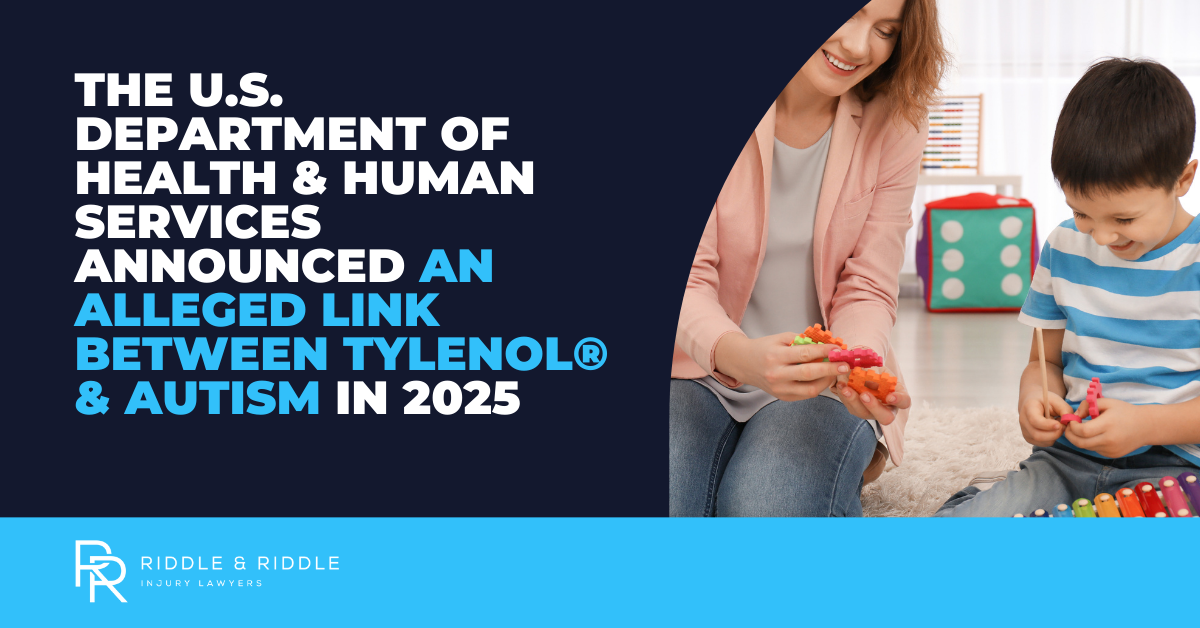Riddle & Riddle Injury Lawyers | September 24, 2025 | Product Liability

Tylenol (acetaminophen) has long been considered one of the safest over-the-counter medications, particularly for pregnant women who are discouraged from using NSAIDs or stronger pain relievers. But in September 2025, the U.S. Department of Health and Human Services (HHS) made headlines by announcing new initiatives and raising the possibility that prenatal acetaminophen use may be linked to autism and ADHD in children.
This announcement has spurred intense interest, debate, and scrutiny across the medical, research, and legal communities. At Riddle & Riddle, this issue is deeply personal: many of our attorneys and staff have family members or close friends with autism, and we are committed to supporting families seeking clarity and accountability. Below is a balanced, updated look at what the science shows — and doesn’t — about whether Tylenol might play a role in autism risk.
The Government Announcement: HHS + FDA Actions
On September 22, 2025, HHS and Secretary Robert F. Kennedy Jr. announced a series of actions aimed at confronting the “autism epidemic.” One component was a formal notification regarding research suggesting a possible link between acetaminophen use during pregnancy and later neurodevelopmental conditions.
The FDA also issued a release announcing that it is initiating a safety label change process for acetaminophen and alerting physicians about the evidence of possible association. Importantly, the FDA emphasized that a causal relationship has not been established.
Studies Suggesting a Possible Link
Because the question is new and evolving, most of the relevant literature is observational. Some of the most widely discussed studies include:
- A Mount Sinai study found that prenatal acetaminophen exposure may increase the risk of neurodevelopmental disorders, including autism and ADHD.
- A review published in Environmental Health argued that many well-designed studies report higher rates of autism or ADHD in children whose mothers used acetaminophen during pregnancy.
- Harvard researchers also published findings suggesting that long or frequent prenatal exposure may be linked to increased risk.
Studies Suggesting No Clear Link
Other studies and organizations have pushed back, cautioning against overinterpreting associations. For example:
- A 2024 JAMA study using sibling-matched analyses found no evidence that acetaminophen use was associated with autism, ADHD, or intellectual disability.
- The American College of Obstetricians and Gynecologists (ACOG) issued a statement reaffirming the established safety profile of acetaminophen in pregnancy and noting that not a single reputable study has concluded acetaminophen causes neurodevelopmental disorders.
- The World Health Organization (WHO) emphasized there is currently no conclusive scientific evidence confirming a link.
Why the Evidence Is Hard to Interpret
Understanding whether Tylenol causes autism is extremely challenging due to multiple factors:
- Confounding variables (such as infections or fever).
- Genetic predispositions that strongly influence autism risk.
- Recall bias in self-reported medication use.
- Variability in dose, timing, and duration of Tylenol use.
- Family-level factors that are difficult to fully control.
Because of these complexities, many experts describe findings as preliminary rather than proof of causation.
What Parents Should Take Away
- There is no definitive causal link between Tylenol and autism, but it has been alleged by many, and even suggested in some studies.
- Even in studies showing associations, the absolute risk increases are small.
- Tylenol remains one of the few over-the-counter medications often recommended during pregnancy when medically necessary.
- Pregnant women should use the lowest effective dose for the shortest duration and consult with their doctors before taking Tylenol or any other medication.
- More research is needed, and recommendations may evolve.
Frequently Asked Questions About Tylenol® and Autism
Does Tylenol definitely cause autism?
It has not been proven definitively. The evidence is mixed, and no causal relationship has been fully established.
Is Tylenol safe to use during pregnancy?
Most experts and organizations like the American College of Obstetricians and Gynecologists (ACOG) still consider Tylenol safe when used appropriately, but recommend limiting use and consulting with a physician.
What do manufacturers say about Tylenol and autism?
The manufacturer of brand-name Tylenol, Kenvue, denies the medication causes autism and emphasizes decades of widespread safe use. Kenvue also strongly denies any liability in Tylenol autism lawsuits.
Are there lawsuits about Tylenol and autism?
Yes. Families nationwide are filing Tylenol autism lawsuits alleging prenatal Tylenol use contributed to autism or ADHD, though these cases are in early stages.
How do I know if I qualify for a Tylenol lawsuit?
Eligibility for a potentail Tylenol lawsuit depends on prenatal use, timing (second and third trimesters), the child’s diagnosis, age, and other factors. This litigation is also fast-moving, and criteria is subject to change.
Tylenol Lawsuits: Why These Cases Matter to Us
At Riddle & Riddle, the Tylenol autism lawsuits are not just another area of litigation. They are personal. Many of our Tylenol lawsuit lawyers and staff have family members and close friends on the autism spectrum, and we know the challenges families face every day. That makes us even more determined to fight for affected families and ensure they have the support they need.
With more than $850 million recovered for clients since 2000 and over 190 years of combined legal experience (see disclaimer below), we have the resources and dedication to pursue dangerous drug claims. If your child was diagnosed with autism or ADHD following prenatal Tylenol use, we want to help.Call 1-800-525-7111 today for a free case review. There are no upfront costs and we don’t get paid unless you do. When Justice Counts™, we’re ready to fight for you and your family.
Contact Our Tylenol Autism Lawsuit Lawyers For A Free Consultation
For more information, please contact Riddle & Riddle Injury Lawyers to schedule a free consultation with a Tylenol autism lawyer in North Carolina today. We have twelve convenient locations in North Carolina, including Greenville, Raleigh, Goldsboro, Jacksonville, Kinston, Charlotte, Greensboro, Durham, Fayetteville, Wilmington, Winston-Salem & Garner.
